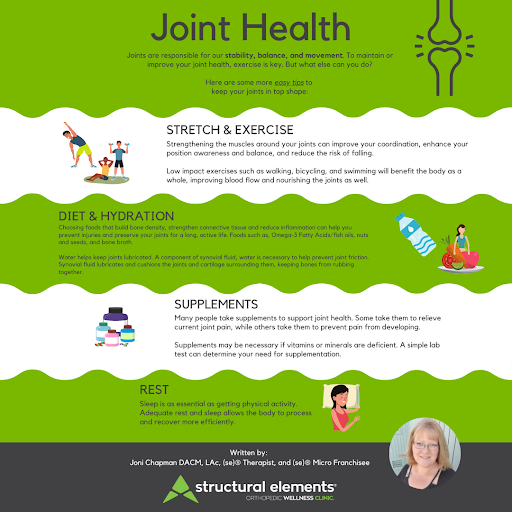
Keep Your Joints Moving Freely
How many times have you thought about how your joints may affect the pain you may be experiencing? First let’s talk about what exactly a joint is:
A joint is where two or more bones are joined together. Joints can be rigid, like the joints between the bones in your skull, or movable, like knees, hips, and shoulders. Many joints have cartilage on the ends of the bones where they come together. Healthy cartilage helps you move by allowing bones to glide over one another. It also protects bones by preventing them from rubbing against each other.
Healthy joints are important for many reasons. They are responsible for our stability, balance, and movement are directly influenced by our joints. Keeping your joints healthy will allow you to run, walk, jump, play sports, and do the other things you like to do. Physical activity, a balanced diet, avoiding injuries, and getting plenty of sleep will help you stay healthy and keep your joints healthy too.
STRETCHING AND EXERCISE - Strengthening the muscles around your joints can improve your coordination, enhance your position awareness and balance, and reduce the risk of falling. Low impact exercises such as walking, bicycling, and swimming will benefit the body as a whole, improving blood flow and nourishing the joints as well.
DIET AND HYDRATION - What you incorporate into your diet can affect your joints. Choosing foods that build bone density, strengthen connective tissue and reduce inflammation can help you prevent injuries and preserve your joints for a long, active life. Foods such as, Omega-3 Fatty Acids/fish oils, nuts and seeds, and bone broth. Water helps keep joints lubricated. A component of synovial fluid, water is necessary to help prevent joint friction. Synovial fluid lubricates and cushions the joints and cartilage surrounding them, keeping bones from rubbing together.
SUPPLEMENTS - Many people take supplements to support joint health. Some take them to relieve current joint pain, while others take them to prevent pain from developing. Supplements may be necessary if vitamins or minerals are deficient. A simple lab test can determine your need for supplementation. Supplements such as Potassium and Magnesium do wonders for the joints. Potassium helps maintain fluid levels in the body and regulates calcium and phosphorus in the joints and body. Magnesium can help with sleep, mood, muscle pain and benefits the joints. A deficiency of magnesium can contribute to inflammation in the body.
REST - Sleep is as essential as getting physical activity. Adequate rest and sleep allows the body to process and recover more efficiently.
Daily exercise, a healthy balanced diet, adequate hydration and sleep will promote healthy joints to keep you moving longer. Please remember to consult with a healthcare professional before beginning any new exercises and/or supplements.
Written by:
Joni Chapman, DACM, LAc, (se)® Therapist, and (se)® Micro Franchisee

Download the (se)® LAB App
You get the latest research and information about nutrition, goal setting, pain management tips, corrective exercises from our amazing therapists, and so much more at your fingertips!
Stay connected with news and updates!
Join our mailing list to receive the latest news and updates from our team.
Don't worry, your information will not be shared.
We hate SPAM. We will never sell your information, for any reason.

